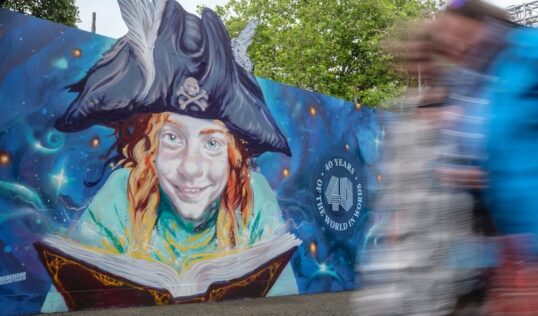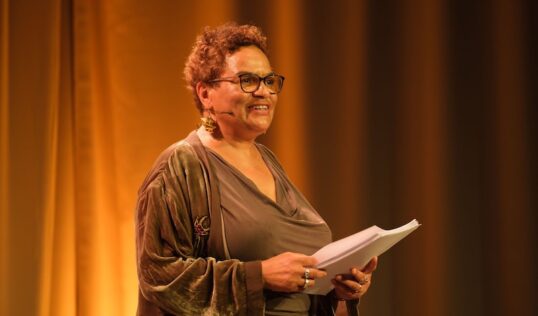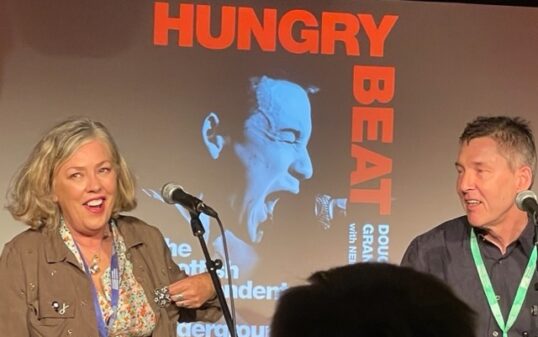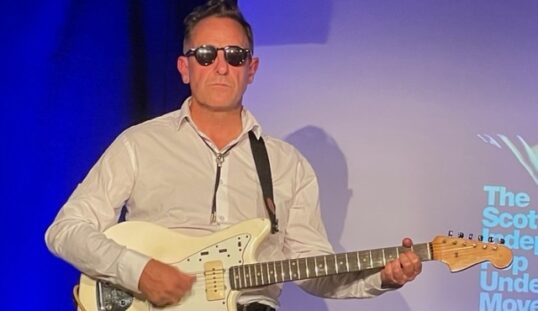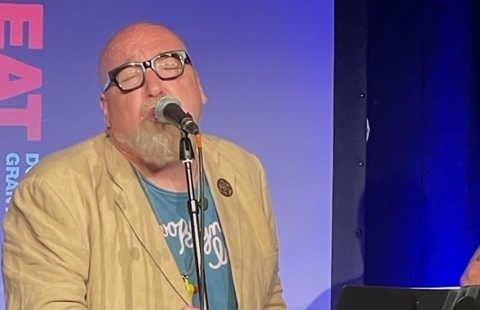Book Festival Round-Up
Hugh Simpson reports
The Edinburgh International Book Festival may this year be missing most of its usual quota of performances that are staged, semi-staged or otherwise theatre-adjacent, but there is still a great deal to entertain and educate.
The most notable figure from Scottish theatre to appear in the first week was the Lyceum’s David Greig, but he was there in another capacity – to celebrate the upcoming publication of his first ever novel Columba’s Bones in Birlinn’s Darkland Tales series. Greig was appearing with Alan Warner (who has just published Nothing To Fear From Hell, another book in the same series, and is always honest and interesting concerning the writing process).
Talking about his ‘Viking heist gone wrong’, Greig said he had gained a new insight into the different requirements of writing dialogue in a play and in a novel. All this time when adapting novels for the stage, he said, he had just thought that novelists were terrible at dialogue. The restrictions placed on the writer by the Darkland series also seemed to have stimulated Greig’s creativity (although perhaps not enough to deliver the manuscript on time).
Around the time of his appearance, Greig was attracting controversy on what used in the old days to be called Twitter, and further conflict seemed certain to follow the Festival around, after walk-outs and proposed boycotts. The initial furore died down quickly (either regrettably or fortunately, depending on your point of view), and it remains to be seen just how much the demands made by many authors will affect Jenny Niven’s first year in charge in 2024.
spirit of inclusion
The (largely manufactured) ‘free speech’ rows in the media are largely absent at the Book Festival, whose spirit of inclusion tends to dampen down such disagreements. There do not even seem to be as many occasions as last year of people complaining that the forces of ‘wokeness’ are preventing them from discussing the views they then proceed to air at length in a public forum. But maybe that’s just because many events have a much shorter time for questions from the audience than previously.
One writer who did discuss political pressure was Jackie Kay, who said that her time as national Makar made her much more wary about publicly airing her views, conscious as she was of representing all of Scotland, not just those who agreed with her. Luckily, she cannot be silenced for long, and a discussion of her upcoming book of poetry A Life In Protest led to recollections of political involvement that goes back to being taken on marches as a baby.
Kay is one of those (relatively few) writers whose public appearances are as compelling as her work, and – in an event excellently chaired by Edinburgh’s own Makar Hannah Lavery – her humour, commitment, generosity of spirit and dedication to her craft shone through.
Kay has become an accepted part of reading lists and so, is part of the ‘Scottish canon’ – the subject under discussion in Do We Need a New Canon? featuring Professor Gerard Carruthers, Professor Alan Riach and Sara Sheridan. This was a strange, vaguely self-congratulatory event, with much talk of openness but little new ground covered.
loose canon
Riach’s adoption of a ‘loose canon’ (a joke he enjoys so much he made it on several occasions) seems to mean little more than a list of those writers he personally enjoys. The undoubted strides made in rediscovering previously marginalised female writers, or those writing in minority languages, were celebrated but important questions went unanswered. Chief among these is how any canon, loose or not, can be enriched when the gatekeepers remain the same – something certainly appreciated by Sheridan, who at one point described her position on the stage as ‘an academic sandwich’.
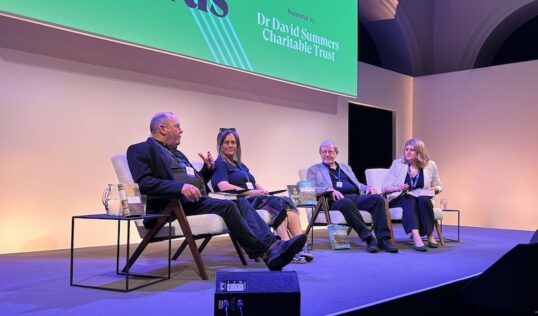
Gerard Carruthers, Sara Sheridan, Alan Riach and Amina Shah (chair) in Do We Need A New Canon? Pic: Edinburgh International Book Festival
One poet whose place in the current pantheon seems more than secure is Don Paterson. Yet his appearance under the title A Poet’s Life barely mentioned poetry at all – with one of the few exceptions being his advice to an aspiring writer that there was no money in poetry, and that is why he ‘got into aphorisms’.
Instead, the spotlight was on his memoir Toy Fights, which deals with his first 20 years, when music (still very much part of his life, of course) was his primary focus. Painfully honest as always, Paterson talked with candour about his love-hate relationship with Dundee, his family, and a breakdown that he later discovered was termed an ‘adolescent schizophrenic episode’.
Kailyard 2.0
His description of having to rebuild the core of his self completely was as penetrating as his later takedown of what he calls the ‘Kailyard 2.0’ strain of Scottish writing, with its glorification of poverty for export purposes. Paterson’s anger that poverty is not a more ‘fashionable’ political cause led his ‘lecture voice’ to become notably more Dundonian, something that gave the captioning system even more problems than usual.
An event that had a real performance element was We Oppose All Rock ‘n’ Roll, held in the Wee Red Bar (with, as was pointed out more than once, no bar). Douglas McIntyre and Grant McPhee (authors with Neil Cooper of Hungry Beat, the excellent oral history of post-punk music in Scotland) were interviewed by Nicola Meighan along with Paul Research of the Scars and Hilary Morrison, of the Flowers but more centrally of Fast Product and pop:aural record companies. To add spice, the event was literally yards from both the Tap O’ Lauriston pub, and – most importantly of all – the Keir Street flat where Morrison was one of the residents, and which had a vital role in the whole scene.
McIntyre and McPhee were more sidelined in the discussion than might have been expected, but Research remains a fascinating figure, and the opportunity to hear from Morrison was too important to be missed. While clearly hugely proud of what was accomplished, she is still obviously ambivalent about talking about those years.
jaw-dropping
The sidelining and sexism she faced (although not from her closest associates, who she describes as ‘non-gender-conforming’ before their time) has carried on. She told a jaw-dropping story about a much more recent occurrence, when as a mature student she encountered an academic who was researching the very bands she brought to public attention. When she introduced herself, he completely ignored her, no doubt lest it interfered with the narrative he had constructed.
That the events of those years have never really been fully assimilated was demonstrated by the subsequent live set of spiky punk-funk by the Hungry Beat Group. Covers of Richard Hell, Television and James Chance as well as the Gang of Four, the Pop Group and the Fire Engines show just how much power and influence it all had.
It is probably fair to say that the band did not feature quite so many well-known names as took part in previous events associated with the book, but was impressive nonetheless, and fronted by Dancin’ Dave Carson, who before leading Boots For Dancing was at least partly responsible for kicking off the whole punk and post-punk scene in Edinburgh when he worked at Virgin Records. Part evergreen rocker, part magus, part force of nature, Carson’s performance was just one of those unexpected joys that the Book Festival specialises in.
The Book Festival continues at the Edinburgh College of Art until Monday 28 August
Many past events are still available to watch online on a pay-what-you-can basis.
More details at https://www.edbookfest.co.uk
ENDS








